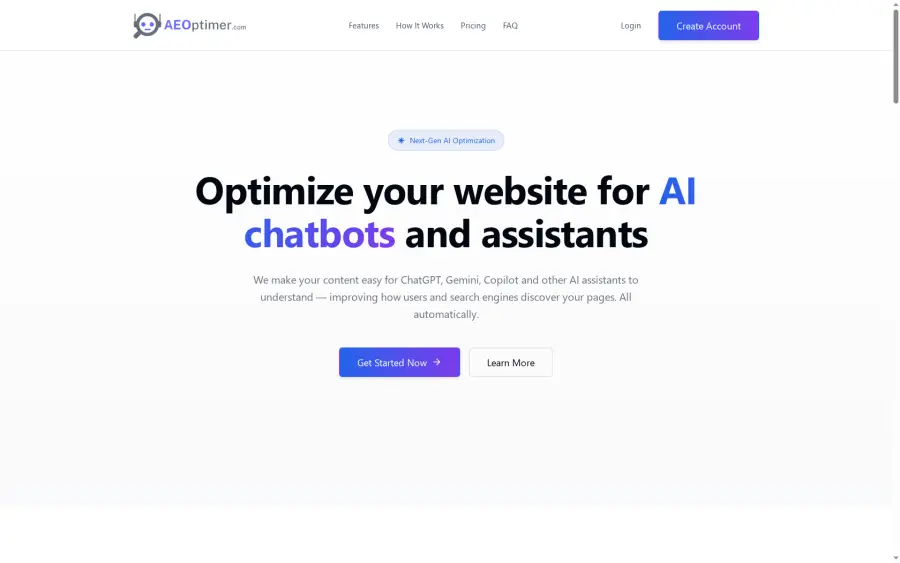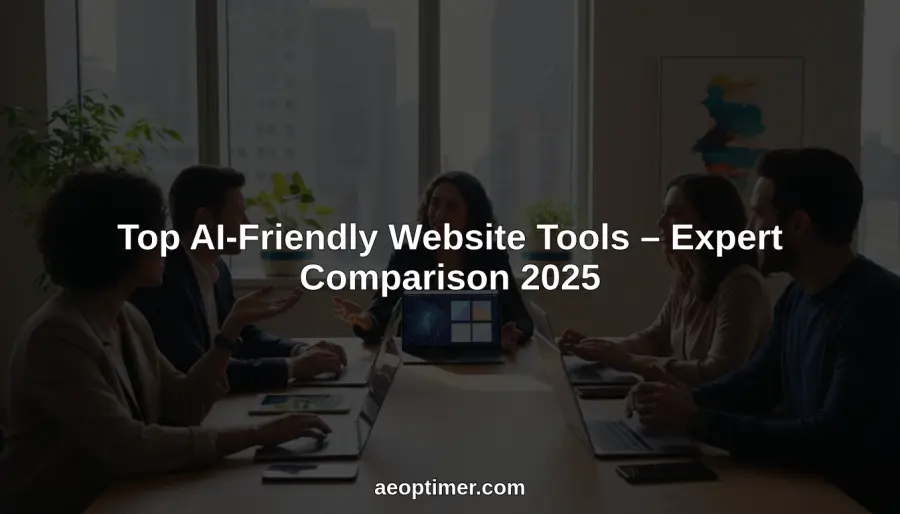Monthly Website Optimization Steps for AI Discoverability

Did you know that over 60 percent of website visits now come from AI-driven discovery tools and search engines? Staying visible goes far beyond old-school SEO tactics. With evolving algorithms and intelligent platforms shaping what gets seen online, mastering AI discoverability has become a must. The following steps will guide you through practical methods, combining automation and smart analysis, to make sure your website stands out in the new digital search environment.
Table of Contents
- Step 1: Set Up Automated Optimization Tools
- Step 2: Review AI and Search Engine Insights
- Step 3: Update Structured Data and Content Enhancements
- Step 4: Verify Technical Health and Sitemap Accuracy
- Step 5: Assess Results and Plan Next Month’s Actions
Quick Summary
| Key Point | Explanation |
|---|---|
| 1. Choose a Reliable Optimization Tool | Select an AI-driven tool that integrates seamlessly and enhances website performance proactively. |
| 2. Analyze AI Insights for Content | Utilize tracking tools to understand how generative search engines rank and prioritize your website content. |
| 3. Implement Structured Data Markup | Use relevant schema types to clearly communicate your content to AI platforms for better categorization. |
| 4. Conduct Comprehensive Technical Audits | Regularly check site speed, mobile responsiveness, and URL structures to ensure effective crawling by AI tools. |
| 5. Measure Performance and Adjust Strategy | Track key metrics to evaluate AI visibility and refine optimization efforts, focusing on high-performing content. |
Step 1: Set Up Automated Optimization Tools
You are about to transform your website’s AI discoverability with strategic automated optimization tools. According to research from Previsible, AI-driven tools enable continuous monitoring and adjustment of website performance, ensuring alignment with evolving search algorithms.
Starting your optimization journey requires selecting a reliable platform that can seamlessly integrate with your existing website infrastructure. Look for tools that offer comprehensive scanning capabilities and automatic content enhancement features. Your ideal solution should provide real time updates without requiring manual intervention.
When evaluating optimization platforms, consider these key capabilities:
- Automatic sitemap detection
- Continuous content analysis
- AI algorithm compatibility
- Structured data implementation
- Performance tracking metrics
Pro Tip: Choose a platform that offers transparent reporting and allows manual review options to maintain full control over your website modifications.
The next phase involves installing the selected platform’s tracking script on your website. This small piece of code will enable automatic crawling and intelligent content updates that keep your site competitive in AI search results.
After setup, expect gradual improvements in your website’s AI discoverability and search engine rankings. Your proactive approach sets the stage for enhanced digital visibility.
Step 2: Review AI and Search Engine Insights
Unlocking the secrets of AI search engine performance starts with understanding how generative platforms interpret your website content. According to research from ArXiv, generative search engines prioritize content with high predictability and semantic similarity, dramatically changing how we approach digital optimization.
To effectively review AI and search engine insights, begin by analyzing your current website performance through specialized tracking tools. These tools provide detailed metrics about how AI platforms understand and rank your content. Look for patterns in semantic relationships, keyword relevance, and content structure that align with generative search preferences.
Key areas to examine include:
- Content semantic consistency
- Information predictability
- Structural content coherence
- Keyword and topic relevance
- Contextual information depth
Pro Tip: Pay close attention to how your content flows and connects ideas transparently.
Research from ArXiv emphasizes that the emerging generative engine ecosystem requires a new optimization paradigm. This means moving beyond traditional SEO techniques and focusing on creating content that AI platforms can easily comprehend and integrate.
Your goal is to craft content that speaks the language of AI search algorithms while remaining engaging and valuable to human readers. The insights you gather will become the foundation for your next optimization steps.
Step 3: Update Structured Data and Content Enhancements
Transforming your website into an AI friendly platform requires strategic content structuring and intelligent data markup. According to insights from Luxury Presence, implementing specific schema markups like ‘Person’ or ‘LocalBusiness’ schemas can dramatically improve how AI platforms understand and categorize your website content.
Begin by identifying the most appropriate schema types for your website. Each industry and business type has unique schema options that help AI comprehend your content more accurately. For instance, a local restaurant might use ‘Restaurant’ schema while a professional service provider could leverage ‘LocalBusiness’ or ‘Professional Service’ schemas.
Key structured data enhancement strategies include:
Here’s a comparison of structured data strategies and their benefits:
| Strategy | Purpose | Potential Benefit |
|---|---|---|
| Schema markup | Signal content type to AI | Improved categorization |
| Metadata descriptions | Provide context to search engines | Enhanced search snippets |
| FAQ sections | Deliver concise answers | Increased feature visibility |
| Content summaries | Summarize key info for AI parsing | Faster comprehension by algorithms |
| Consistent info across pages | Ensure reliability of data | Higher trust in content by AI |
- Implementing precise schema markup
- Adding clear metadata descriptions
- Creating comprehensive FAQ sections
- Developing concise content summaries
- Ensuring consistent information across pages
Pro Tip: Always use authoritative and current information when creating structured data entries.
Research from DotCMS highlights that regularly updating content with citable data and utilizing structured formats significantly boosts AI discoverability. This means your content should not just be accurate but also presented in ways that AI can easily parse and understand.
Your structured data updates will create a clear roadmap for AI search engines to navigate and interpret your website content efficiently.
 The next phase involves verifying these enhancements and monitoring their impact on your overall digital visibility.
The next phase involves verifying these enhancements and monitoring their impact on your overall digital visibility.
Step 4: Verify Technical Health and Sitemap Accuracy
Ensuring your website is technically sound is crucial for optimal AI discoverability. According to research from DotCMS, maintaining robust technical SEO health is vital for AI tools to effectively crawl and index your website content.
Start by conducting a comprehensive technical audit of your website. This involves examining multiple critical areas that impact AI and search engine performance. Run diagnostic tools that can identify potential issues like slow page load times, broken links, uncompressed images, and mobile responsiveness problems that could hinder AI crawling and indexing.
Key technical health checkpoints include:
- Verifying site loading speed
- Checking mobile device compatibility
- Identifying and fixing broken links
- Optimizing image file sizes
- Ensuring clean URL structures
- Validating robots.txt configurations
Pro Tip: Use multiple diagnostic tools to get a holistic view of your website’s technical performance.
Your sitemap serves as a critical roadmap for AI search engines. Verify that your sitemap is current, accurately represents all important pages, and follows XML sitemap best practices. This means including only canonical URLs, providing last modification dates, and ensuring all critical pages are properly indexed.
A well-maintained technical infrastructure communicates reliability and professionalism to AI platforms. By systematically addressing these elements, you create a smooth pathway for AI tools to understand and navigate your digital content effectively.
Step 5: Assess Results and Plan Next Month’s Actions
Tracking your website’s performance in the AI ecosystem requires strategic analysis and forward thinking. According to research from Relixir, measuring AI Share of Voice and citation metrics provides critical insights into your website’s visibility within emerging AI platforms.
Begin by generating comprehensive performance reports that highlight key metrics such as AI search rankings, content engagement rates, and semantic relevance scores. Look for patterns in how AI platforms are interpreting and presenting your content. Pay special attention to which pages are performing well and which might need strategic refinement.
Key performance evaluation metrics include:
- AI Share of Voice percentage
- Content citation frequency
- Page relevance scores
- Semantic search rankings
- User interaction data
Pro Tip: Compare your current metrics against baseline measurements to track genuine improvement.
Research from TRE Digital suggests regularly updating top performing pages with summaries, FAQs, and comparison tables to enhance AI visibility. This approach allows you to maximize existing content while strategically improving discoverability.
Your assessment should culminate in a clear action plan for the upcoming month. Identify specific pages needing optimization, content areas requiring deeper semantic structure, and potential new strategies for improving AI recognition. Continuous iteration is the key to staying competitive in the rapidly evolving digital landscape.
![]()
Enhance Your Website’s AI Discoverability Effortlessly
Struggling to keep up with the ever-changing AI search algorithms and complex optimization steps outlined in the article The challenge of maintaining structured data, updating content semantically, and verifying technical health can feel overwhelming without specialized tools. If you want to increase your website’s visibility to AI assistants like ChatGPT and stay ahead in AI-driven search results you need a solution that automates these crucial tasks seamlessly

Discover how aeoptimer.com transforms your website by adding AI-friendly structured data and content enhancements automatically. With features like automatic sitemap detection, real-time content updates, and manual review options you can relax knowing your site is optimized every month without changing its look. Don’t let complex AI optimization hold you back. Visit aeoptimer.com now to start your free trial and secure your spot ahead of competitors in the AI search ecosystem
Frequently Asked Questions
How can I set up automated optimization tools for my website?
To set up automated optimization tools, select a platform that integrates seamlessly with your website infrastructure. Install the platform’s tracking script on your site to enable automatic crawling and content updates. This step will initiate improvements in AI discoverability within a few weeks.
What key metrics should I review when assessing AI discoverability?
Important metrics to assess include AI Share of Voice percentage, content engagement rates, and semantic relevance scores. Analyze these metrics regularly to identify which pages are performing well and track changes over time.
How do I update structured data for better AI optimization?
To update structured data, implement appropriate schema markup relevant to your website’s content, such as ‘LocalBusiness’ for service providers. Review and enhance your metadata descriptions and FAQ sections to provide clearer context, leading to improved content visibility.
What technical health aspects should I check for optimal AI discoverability?
Focus on verifying site loading speed, mobile compatibility, and fixing any broken links. Conduct a thorough technical audit to identify these issues and ensure your site’s URL structure is clean, which will help AI tools crawl and index your content more efficiently.
How often should I assess my website’s performance for AI optimization?
You should assess your website’s performance monthly to ensure it remains competitive in the evolving AI landscape. Generate performance reports that highlight key metrics and create a clear action plan for the next month based on your findings.





